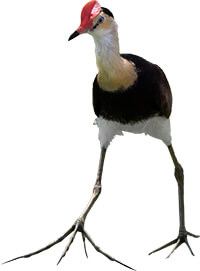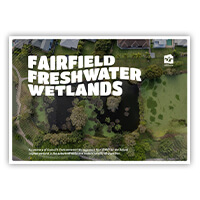Waterways and Wetlands
Townsville has four lakes (Lake Ross, Curralea Lake, The Lakes, and Lake Idalia), three major rivers (Ross River, Black River, and Bohle River), and three major wetlands (Town Common, Rowes Bay, and Borrow Pits). All these waterways and wetlands influence the Great Barrier Reef Marine Park.
Wetlands are natural filtration systems that safeguard coastal areas against storm surges and flooding. They are often referred to as the ‘kidneys’ of our environment, filtering upland runoff and pollutants from entering downstream waterways. Wetlands aren’t always wet; they can be dry for months at a time. Certain wetlands in the Townsville region can be either fresh water or salty. This is due to the freshwater inflow after rain events, and the seawater inflow during the highest tides from the surrounding catchments.
Waterways and Wetlands factsheets:
- Borrow Pits, Kelso (PDF, 442.8 KB)
- Mundy Creek Catchment (PDF, 285.4 KB)
- Ross River (PDF, 1.5 MB)
- Town Common Concept Plan - Revitalising Townsville Town Common (PDF, 4.4 MB)
- Town Common Wetlands (PDF, 10.8 MB)
Flora

Aquatic and riparian vegetation is important for the health of waterways, as they provide food, shade and nutrient recycling services. They also contribute to the balance of dissolved oxygen in a waterway, resulting in the natural management of toxic algal blooms. Aquatic plants can be free floating or have root-like structures in the sediment. Riparian vegetation grows along the banks of a waterway, assisting with bank stabilisation through erosion control.
Weeds within our natural wetlands and waterways can decrease dissolved oxygen levels, restrict, or change the flow of water leading to flooding, restrict the movement of fauna, prevent native regeneration, and restrict recreational use.
Flora resources:
- Invasive Weed Factsheet (PDF, 1.3 MB)
- Native Aquatic Plants Factsheet (PDF, 1.1 MB)
- Plants of the Townsville area on WetlandInfo
Fauna
 Townsville’s waterways and wetlands, and their surrounding vegetation attract a wide variety of animals with the most obvious and easiest to sight being birds. What we usually don’t see is the huge range of insects and other small animals that are the smorgasbord of birds and larger animals.
Townsville’s waterways and wetlands, and their surrounding vegetation attract a wide variety of animals with the most obvious and easiest to sight being birds. What we usually don’t see is the huge range of insects and other small animals that are the smorgasbord of birds and larger animals.
Our waterways and wetlands also provide many animals with the shelter and breeding habitat required to maintain biological cycles. More than 200 bird species rely on our freshwater systems and an abundance of marine organisms rely on river flows to complete their life cycle.
Fauna resources:
- Birds of the Townsville area on WetlandInfo
- Visit our Wildlife page for information on Townsville's wildlife overall
Fairfield Freshwater Wetlands Environmental Management Plan (EMP)
 This document is a summary of our Wetland Management of School Lagoon at Fairfield, and we aim to educate about the importance of this local wetland, its diverse array of native wetland birds, fish and aquatic biota and complex vegetation.
This document is a summary of our Wetland Management of School Lagoon at Fairfield, and we aim to educate about the importance of this local wetland, its diverse array of native wetland birds, fish and aquatic biota and complex vegetation.
Council’s Environmental Management Plan for this locally important and historic natural wetlands intends to share our annual maintenance works for the two nutrient basins and what Council is doing to help the wetland remain in place.
As an oasis that is constantly changing, it can sometimes appear a little bit messy, and we actively manage the wetland for this fact. We share how you as a neighbour can help this wetland too, with your own backyard and street behaviours.
- Fairfield Freshwater Wetlands EMP (PDF, 3.4 MB)





